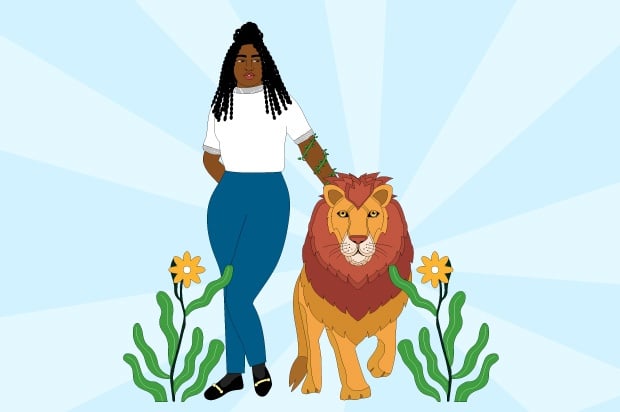How I decided to honour my self-harm scars


(T/W) Article contains references to self-harm)
Hi! I’m Janet – a Student Mental Health Nurse and Mental Health Awareness Blogger. I’m passionate about mental health in the black community. I hope my writing is able to challenge stigma and discrimination, change the narrative surrounding mental health and recovery, and encourage others to live a happy and healthy life.
My journey with my self-harm scars
Looking at my self-harm scars was something I actively avoided doing for years – I mean, I knew they were there, but actually looking at them; cut by cut. Each with their own timestamp and backstory; it would break my heart knowing I’d ever felt so low that I would physically hurt myself.
Over the years, accepting my self-harm scars became easier – but equally more difficult – to see the beauty in my body. A time where everyone was learning to love their lumps and bumps and hashtag #selflove was featured under every Instagram post, social media movement and pushed into the recovery agenda, I found it difficult to love myself whole.
Deciding to cover my self-harm scars
Deciding to cover my scars was integral to my recovery as I finally felt I’d reached a point where it would be *very* unlikely to self-harm again. I self-harmed for 10 years before having a full year without a relapse. To celebrate this, in September 2020, I felt I was finally ready to close that chapter of my life and to finally, take steps to cover my self-harm scars.
I had played with the idea of scar/keloid removal, but a tattoo seemed more fitting. I had this idea of having a lion on my arm, and an image of my scars blending perfectly into the lion’s mane. It all made sense in my head, and it seemed so simple, but it would be one thing finding a tattoo artist who is well-versed in tattooing darker skin tones, and another thing, finding a tattoo artist who is comfortable tattooing over scars. It wasn’t at all simple; it took a few months, much explaining and photographs of my scars, to find the perfect tattoo artist (@Tianna.Tatts), who was patient, understanding and accommodating of my feelings while also acknowledging the importance of this chapter in my recovery.
Tattooing over my self-harm scars
I decided on a lion, symbolising courage and strength along with flowers that stem from the lion’s mane, symbolising growth and blossoming.
As beautiful as the piece is, nothing prepared me for the pain I would endure for 3.5 hours, whilst having a tattoo needle stabbing through my already delicate scars. Despite the misunderstanding that self-harmers find tattoos less painful due to their alleged high pain tolerance, getting the tattoo completed was physically painful and uncomfortable, yet extremely satisfying and liberating.
I felt like it was the first day of the rest of my life; a life where I finally felt that I owed myself more than ruining my body, where I didn’t need to hide behind long sleeves and oversized clothing, where I could enjoy the summertime, feel comfortable in my body and not worry about what other people may be thinking.
Tattooing over my self-harm scars was easily the best decision I’ve made to aid my recovery. I underestimated the impact the tattoo would have on my life; being able to turn my darkness into light is a feeling that is unmatched. My cover-up tattoo has given me the beauty I was searching for all these years while pushing me to never want to self-harm again.
Covering self-harm scars isn’t the right choice for everyone
Honouring my self-harm scars was – and still is – extremely important to me but it is worth noting that having scars is nothing to be ashamed of. Being able to get my scars covered up is a privilege and is great, but also doesn’t mean that everyone should. My scars and my cover-up tattoo both remind me that despite everything life has thrown at me, I am still alive. I am not ashamed of my past, and how I chose to cope with distressing feelings.
My scars are now a part of my body, and no amount of hating or hiding will make them disappear. I have actively chosen to acknowledge and honour my scars, rather than hating and loathing them. This has allowed me to fully accept my past decisions, love and accept myself wholeheartedly, and I wish the same for anyone who has self-harmed.
If you are looking for support with self-harm, head to our self-harm hub page for a wide range of support and advice.
Get in touch with our team who are there to support you with anything and everything.
Next Steps
- Our Crisis Messenger provides free, 24/7 crisis support across the UK. If you’re aged 25 or under, you can text THEMIX to 85258
- selfharmUK provides information and advice about self harm. You can ask a question to their expert panel or share your story.
- Self-Injury Support provides emotional support and information for women and girls in distress, especially those who self-harm. You can email or call them for free on 0808 800 8088 or text them on 07537 432444.
- Under 19? You can get confidential help with self-harm from ChildLine – either over the phone or through an online chat.
- Mind offers advice and support to people with mental health problems. Their helpline runs nine to six from Monday to Friday. 0300 123 3393
- DistrACT is a free mobile app available on the App Store (Apple) and Google Play (Android). The app gives discreet access to information and advice about self-harm and suicidal thoughts. The content has been created by doctors and experts in self-harming and suicide prevention.
- Chat about this subject on our Discussion Boards.
By Holly Turner
Updated on 25-Feb-2021
Sorry, comments closed
No featured article














